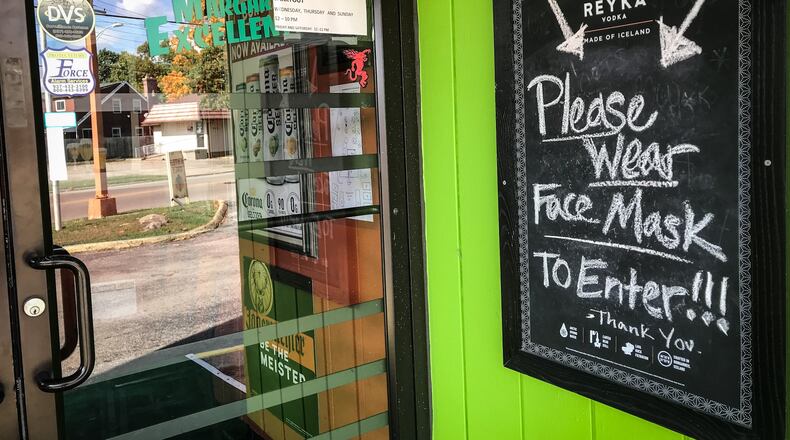“Those employees have jobs to do, and they were just trying to do their jobs,” Glass said. "The governor and the Ohio Department of Health have given us a mandate, and we have to follow that mandate. If we don’t, we can lose our food license. We can lose our liquor license. We can’t take that chance.
“In the end, I just want to protect my employees, and I want to protect my customers. As the owner, that’s what I have to do.”
Glass is not alone. Restaurant owners throughout the Miami Valley and across the country are already being whip-sawed by the coronavirus pandemic in several ways: they lost revenues in the spring when they were forced to shut down dine-in services for two months; they lost seating capacity to state-mandated social-distancing requirements after their restaurants were allowed to reopen; they had to spend money to install barriers and expand patio seating in an effort to woo diners back to their restaurants; and they are losing revenues due to a 10 p.m. curfew on serving alcohol.
Beyond those blows, restaurant owners also know that a significant portion of their customers are still hesitant to eat in their dining rooms — and the recent surge in COVID-19 cases and hospitalizations won’t do anything to ease that reluctance.
Ohio Restaurant Association online surveys of its member restaurants suggest that four out of five of its owners and operators do not anticipate breaking even financially in 2020. And about half of those who responded to the survey don’t believe their business can survive another 9 months under current conditions.
Facing threats on multiple fronts to their very existence, most restaurant owners and managers are in no mood to debate customers about the pros and cons of a mask mandate. The Ohio Department of Health’s guidelines are straightforward in their instructions to restaurants: “Customers and guests must wear face coverings at all times, except when dining.”
Shanon Morgan — president of the Miami Valley Restaurant Association, which is not affiliated with the statewide restaurant association — said she has been hearing reports from restaurant owners of customer backlash against the statewide mask mandate.
“It’s important to remember that those rules are not coming from these individual restaurants,” Morgan said. “The restaurants are simply trying to comply with state guidelines.” Those who do not want to wear a mask shouldn’t go out to eat at a restaurant right now, but should instead order carryout or delivery, Morgan said.
“It’s hard for me to understand how someone can chew out a 16-year-old employee who is just trying to do their job,” Morgan said. “Things are rough enough right now for restaurants. They do not need to be dealing with this.”
Neil Chabut, founder of Eudora Brewing Company craft brewery and restaurant in Kettering, had a few customers enter the brewery without masks two weeks ago, and they apparently became belligerent when asked to put one on. On the brewery’s Facebook page, Chabut posted security-camera video showing the customers as they entered.
“We rarely post stuff like this, because our customers are generally AWESOME people, but I didn’t want to start my Friday with this stuff, so here you go,” Chabut wrote. “If you argue with our staff members about wearing a mask (a state regulation) and then call them awful names on your way out the door, we’re going to put your faces on the internet, and you’re not going to be allowed back into the brewery, like, ever again.”
The National Restaurant Association’s Restaurant Law Center, in partnership with the national law firm Jackson Lewis P.C., developed guidance for restaurateurs to follow when dealing with confrontational customers who refuse to or are reluctant to wear masks. Among the tips: “Employees should not argue with guests who refuse to wear a mask and potentially escalate the situation. Employees should not attempt to apprehend resistant guests, block guests from entering or exiting the store, or physically force guests to leave. Employees should remain calm, discreetly call security or local law enforcement and allow the police to handle it.”
Restaurant owners are also advised to, “Assign the right person(s) to communicate the message. Staff have different skill sets; some are charming and disarming, while others are whizzes with numbers but have a gruff demeanor. The more pleasant the approach with non-compliant guests, the higher likelihood of gaining compliance."
Credit: JIM NOELKER
Credit: JIM NOELKER
Bob Byers, owner of Carmel’s restaurant in Dayton, said he has installed “huge signs at the door” advising customers that masks must be worn.
“Being the owner of a business naturally gives me more leeway to speak abruptly to the guest,” Byers said. "And they know my sense of humor, which always stings with the truth. So for several weeks, I made myself available at the door at the busy times. I gently but firmly asked the guests to go out to the car and get the masks. When assaulted with verbal complaints, I would merely state that they could contact the governor, and I had no further comment on the matter. And if they argued with the hostess, they could go permanently.
“So of course many claimed they would never return with me enforcing the mask mandate. But after a couple weeks, they returned, and often said ‘You win, I miss the staff.’ So at least by me being the loud-mouth bad guy allowed the staff to retain their kind identity.”
“I am sure we have lost some customers. But I believe being consistent at least allows everyone, regardless of how they personally feel about the mask, to feel comfortable coming, because they know the rules of expected behavior. Personally, I feel as in all areas of restaurant/bar service consistency is the key. And so far our business is stable.”
About the Author



